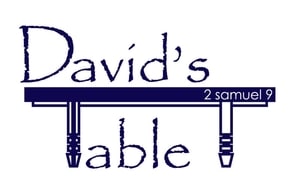 Editor’s Note: Robert “Skeeter” Powell of Greenville, South Carolina, is an unusual individual who defines the word, love. Once you read his story and learn about his calling, you’ll understand why he’s the role model for many. He’s not the most-important person in his world and actually considers himself the least important. But he exemplifies the Bible verse found in Matthew 23:11, “But he who is greatest among you shall be your servant.” Republished with permission by Robert Powell and John E. Phillips.
Editor’s Note: Robert “Skeeter” Powell of Greenville, South Carolina, is an unusual individual who defines the word, love. Once you read his story and learn about his calling, you’ll understand why he’s the role model for many. He’s not the most-important person in his world and actually considers himself the least important. But he exemplifies the Bible verse found in Matthew 23:11, “But he who is greatest among you shall be your servant.” Republished with permission by Robert Powell and John E. Phillips.
“When I was born, my mother and daddy were in the iron and still business,” Powell explains. “My mother ironed, and my dad made sure I sat still and listened. My life really took a turn when I was in high school and was on the football team. I had the opportunity to play in the North Carolina/South Carolina Shrine Bowl football game for North Carolina. The Shriners asked football players from both teams to go visit the children in the Shriners Hospital in Greenville. I like to tell folks that throughout my football career I played tailback. Every time I jumped up off the bench, and ran to the coach on the sidelines, during the game, hoping that he’d put me in the game, he’d always say, “Get your tail back on the bench.”
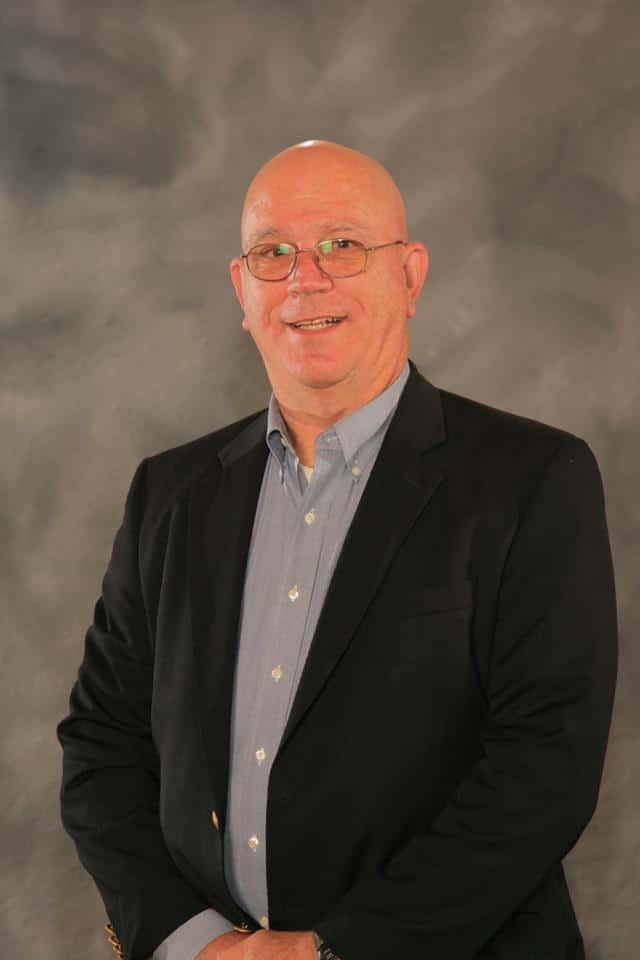
In the Shrine Bowl, I played end. Back then, football players played both offense and defense. North Carolina won the game. What was more amazing than our team winning the Shrine Bowl that year was seeing and meeting those children at the ShrinersHospital. Meeting the children at the Shriners Hospital was where my deep-rooted passion for helping children with physical, mental, emotional and behavioral problems first took hold in my soul.”
Powell’s burning desire to do what he could for these children became the primary focus woven through the fabric of his life and his lifelong desire. “I still think about that first visit to the Shrine Hospital today,“ Powell says. ”I still visit the children there, even now. When I went to college to play football, and anyone asked me about my college football experience, I simply would say to them, ’I’m on the team, where once again, I’m playing 'tailback,’ because my college coach also told me to get my tail back on the bench. My junior year of college, our football team was terrible, but I started every game on the kickoff-return team or the punt-return team. We had two wins and eight losses that year.
My junior year when we played Notre Dame, I got to play a lot in that game. Notre Dame scored a lot, and we didn’t. So, Notre Dame had a lot of kickoffs after they scored. I’d be sent in on the kickoff-return team. While in that game, I had the opportunity to block number 19 with my kidney. After that game, I started going to the bathroom in technicolor.
During those days, if a football player broke his leg, our athletic trainer would give him two salt tablets and say, ‘You’re ok. Get back in the game.’ However, my problem was so severe that I went to the hospital. During the x-rays and scans they did, the doctors had a difficult time finding both my kidneys. They learned that apparently I was born with only one kidney. This discovery caused me not to be able to play football anymore, since I was a freak of nature (having only one kidney), and that kidney was damaged. “
Robert “Skeeter” Powell and Young Life
When Robert “Skeeter” Powell was in the ninth grade, he attended a meeting of Young Life, a Christian organization for young people. According to Powell, “The vision of Young Life is that every adolescent will have the opportunity to meet Jesus Christ and follow Him. The mission is introducing adolescents to Jesus Christ and helping them grow in their faith. Even though I wasn’t in high school, I ran track with the high-school track team. So, I went to Young Life for several years. While in college, I also was in the Young Life program.
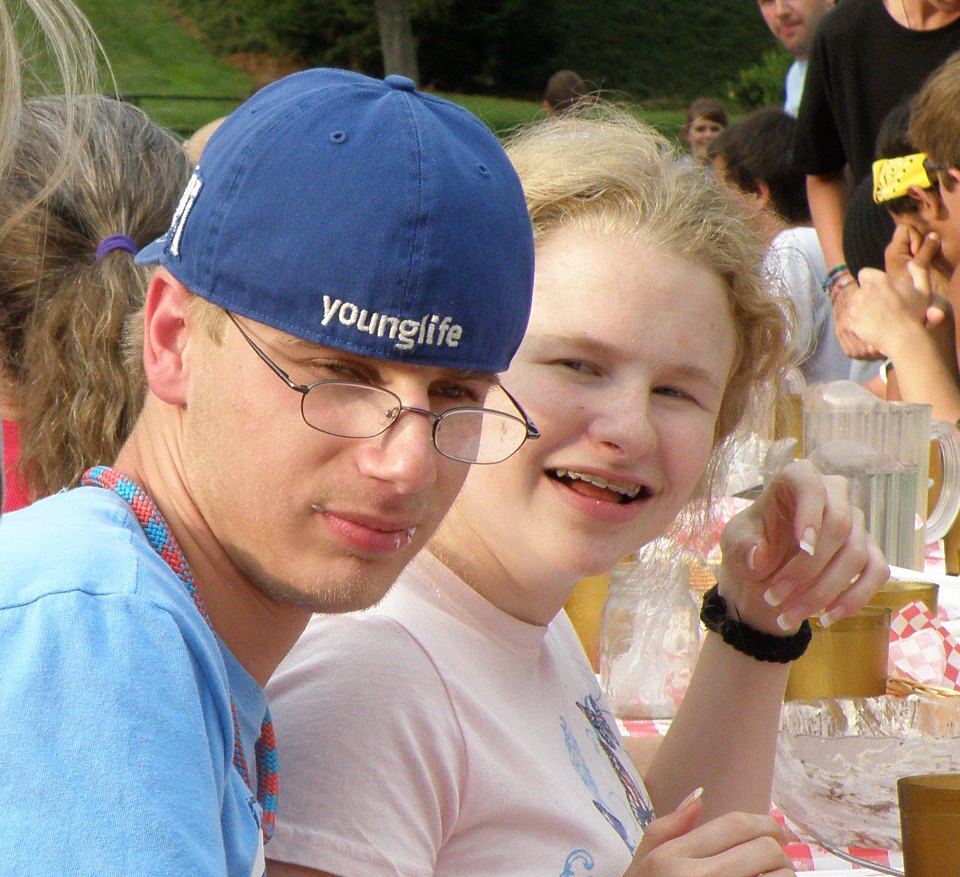
“The Young Life organization started in the early 1940s, primarily ministering to middle- and upper-class students. Then in the 1970s, some volunteers from Young Life went to the lower east side of Chicago and to some of the lower-income communities and schools in New York City and started a division of Young Life called Urban Young Life or Multicultural Young Life. Today there also is Wyldlife, which is primarily for middle-school children; Young Lives, which ministers to pregnant teenagers who don’t have the benefit of husbands; Capernaum Young Life, the division where I work to minister to young people with disabilities; an international division; a military division; and a division that holds summer camps for young people all over the country.”
Powell was on staff with Young Life for about 12 years where he spent 2 years in training and 2 years in Greenville, South Carolina, before according to his mother-in-law, “He retired and got a real job.” He never really stopped working for Young Life. He just sort of scaled it back until his children got in high school, when he started being a volunteer again for Young Life. At that time, he was working with able-bodied youngsters, until the night that Ben Brewer came to a Young Life meeting in a power chair.
“We weren’t expecting Ben, but we were nice to him,” Powell explains. “We didn’t realize, until after the meeting, that his twin brother who was able-bodied was also at this meeting. One of the skits (games we played that night) was that everyone would put a paper grocery bag on his or her head. Two of the students were supposed to identify the students with the grocery bag on their heads, without seeing their faces, or at least that’s what we told the students the skit was. The real game was that we had 350-grocery bags, and 50 of those bags had white flour in them. We told the kids, ‘We’re going to count to three. Then everyone put the grocery bag on your head at the same time.’ We counted to three, and 50 of the young kids who played got a surprise. Ben Brewer was one of the students who got a bag with flour in it. We dusted Ben off like we did the other kids, but he didn’t return the next week to Young Life.
“I spent the next 3 weeks trying to locate Ben to find out why he didn’t come back to Young Life. I was embarrassed to say that I needed 3 weeks to locate him. You’d think spotting a youngster in a power chair in the lunchroom would be easy, but I couldn’t find him. We learned that the reason that Ben hadn’t returned was due to the time commitment that he and his family had to make to get him ready to come to Young Life, to transport him to our meetings and to transport him back home.
Most able-bodied kids could get ready for a meeting and be there in less than an hour. Ben might require possibly 2 hours to get ready, be transported to the meeting, unload his power chair, get Ben into his power chair and let him attend the meeting. Then the same process would be required to get him back home.
After I met and talked with Ben, we decided to set up a Young Life organization for Ben and his other friends, who had some form of disability. The first meeting we had was at Ben’s house, where we played games, sang songs and talked about Jesus. We had about 10 or 12 kids there. One of the kids couldn’t speak. Until I learned that the child couldn’t speak, I kept wondering why he didn’t sing. We had one little girl who could sing, and the rest of the children made a joyful noise. We had fun with Silly String that night, and then we went to a football game away from home.”
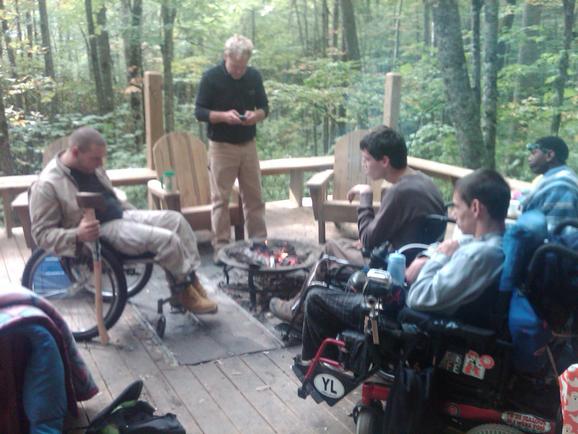
Football Takes on a Different Meaning for Robert “Skeeter” Powell
When Robert “Skeeter” Powell took his first group of disabled young people to a high-school football game, he got a rude awakening about the lack of inclusion. Most of the children were in wheelchairs, power chairs or walkers. The only place for them to sit when they went to the football game was on the track behind the big football players wearing shoulder pads and helmets, which made seeing the game almost impossible for the children with disabilities. “Only one of these 11 children ever had been to a high-school football game before,” Powell reports. “One of the children asked me, ‘What’s an extra point?’”
Let’s fast forward from that first football game, and see what one man dedicated to a purpose and a group of children with disabilities could do to help them see a football game.
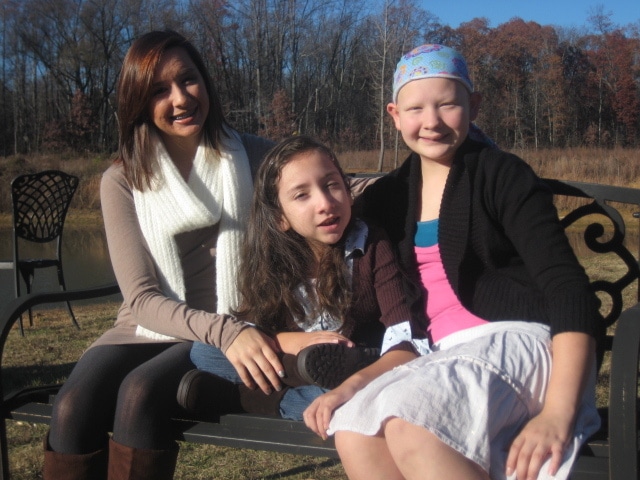
According to Powell, “Our school was building a new football stadium that met all the criteria for accessibility. However, it didn’t consider the socialization of special-needs kids. If the youngsters wanted to sit in the students’ section, they couldn’t. We asked parents to write ‘nice letters’ to the school administration, developers, architects, contractors, the superintendent of schools, the athletic director and the people in charge of special-needs children to consider the possibility of adapting the seating in the football stadium being built, so that the special-needs children could sit close to or near the students’ section. A reporter for the local newspaper learned of what we were trying to do and wrote a really nice article about our concerns.”
The results of the “nice letters” and the “nice article” were that as the football stadium was being constructed, plans were developed, and space was made available for the special-needs students in the football stadium. Today, these students have the best seats in the house. “When the stadium was first built, the special-needs kids had to sit down with the grandparents away from the student body,” Powell remembers. “Now, the special-needs students sit in front of the student body and the band. All that’s in front of them are the cheerleaders and the football field.”
Sometimes, the threat of lawsuits and other veiled threats cause organizations, administrations and society as a whole to provide inclusion devices for individuals with different disabilities. However, what’s unique about this story is that Powell and his team of students, parents, concerned citizens and the press took the opposite path. They demonstrated the need of these children to be a part of all the school functions. They were careful to explain the right things that could be done to insure that these children would be included and considered and also be a part of the student body of the high school, even at football games.
Instead of approaching the problem with a heavy hand, they chose the opposite route. They explained the need and trusted the people in charge to do the right thing. Although this process may not be the best way to approach the need for inclusion in all situations, however, in this instance, “nice letters” and “nice press” achieved the goal for these young people.
What’s David’s Table, and Where Did the Name Come From
When you ask Robert “Skeeter” Powell what has caused him to have such a passion for young people with disabilities, his simple answer is “God."
“When Ben Brewer came to that Young Life meeting many years ago, and I learned of the problems he encountered just being able to come to the meeting, I knew this was an area of service in which I needed to be involved. I just fell in love with Ben and a bunch of his friends. Ben had come to Young Life, because his mom was looking for some type of organization where he could be included. She hadn’t found that type of organization at church, at school or in any of the helping agencies. Most of those agencies had so-many people that they had to help, and were often short of money.
Finding a good fit for Ben had been impossible for his mom, and she was hoping that Young Life might meet her son’s needs. Ben’s mom wanted Ben to be included in everything at school. After all, wasn’t that what was supposed to happen?
Now, don’t get me wrong, I don’t think anybody or any organization deliberately excludes youngsters with disabilities. I do believe that, possibly, because of a lack of funding and a lack of personnel that including young people with disabilities is a real challenge. But this feeling of being ignored creates strife for these children and their families.”
Robert “Skeeter” Powell is one of those rare individuals who once he identifies a need doesn’t just walk around and say that somebody needs to do something about this problem. Instead Powell takes charge. He feels that he’s been blessed by God to solve problems. Powell recognizes that, “Someone needs to love these children and their families.” Not only did Powell see the need, but he also felt called, as a minister, to start off by loving these people and then doing everything he could to solve their problems. How much better the world would be, if there were more people like Powell?
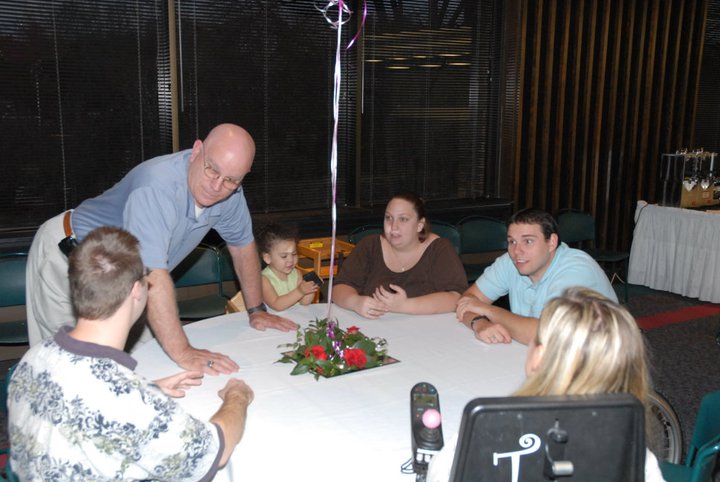
According to Powell, “I never planned to help special-needs children and their families. They just showed-up, and I started trying to help.” Powell took his calling for helping special-needs families and their families one step further by creating a nonprofit organization called David’s Table, based on the Bible story found in 2 Samuel 9, where as told in Powell’s own words, “David just had become king of Israel. In those days a king oftentimes would try to kill anyone he thought might take away his kingdom. But David was looking-out for his friend Jonathan’s family, although Jonathan’s father, King Saul, had been cruel to David. Mephibosheth, Jonathan’s son who was crippled in both feet, was the only one left in Jonathan’s family. David sent for Mephibosheth to be brought to him and said, “Don’t be afraid, for I will surely show you kindness for the sake of your father Jonathan. I will restore to you all the land that belonged to your grandfather, Saul, and you will always eat at my table.”
So, we invite young people to come to the King’s table. We want to try and provide for them, as David did for Mephibosheth, for Christ’s sake. That’s why the name of our organization is David’s Table. Members of David’s Table include Young Life, my church and several-other churches in our area. We have other people helping us, like the United States Tennis Association (USTA), which has been a tremendous support for supplying equipment and instruction to enable our young people to learn the game of tennis and to compete on different levels, like other athletes in high school do.”
The day we spoke with Robert “Skeeter” Powell, he just had come from helping at the local high school during PE, where he had 45 special-needs children playing tennis. Normally these students would be playing outside, but because of rainy-weather conditions their tennis games were moved inside to the gym of JL Mann High School.
![Travis [in the white shirt] loves hitting the tennis courts with his friends in Greenville, SC!](https://wheel-life.com/wp-content/uploads/2013/01/traviswheelchairtenniswhiteshirt.jpg)
Once you look at the numbers that Powell shares, you easily can see the need for volunteers, teachers and helpers to take care of the needs of these students and their families and to make the families and the children feel included in school activities. When we asked Powell why he continued to stay involved and tried to grow the reach of his ministry to these special students, he gave us two answers. “This is a God thing, and these young people need someone to love them.”
Also, as Powell says with a smile, “I’m getting older now (67). I can keep up with youngsters in wheelchairs much better than I can able-bodied youngsters.” Powell is the executive director of David’s Table and works with four, as he puts it, “loosely affiliated other people,” who have the same love for young people with disabilities that he has and also want to support them.
Learning to be Comfortable with the Uncomfortable
The organization David’s Table has a simple mission. “We work with others to love children with disabilities for Christ’s sake,” Powell says. “Disabilities don’t just occur in wealthy families but also in financially-challenged families. This past week in early October, 2012, Young Life provided a van with a lift on it to enable us to transport students back and forth to a tennis tournament that the USTA had set-up for youngsters in wheelchairs from all across the country.
We had about 50 competitors, with one student coming to the tournament from India, who played tennis in his power chair. We had a young lady at the tournament who was ranked second in the world in wheelchair tennis. Also present at the tournament were several people who had played wheelchair tennis in the Paralympic Games this year. We had some amazing tennis players come to Greenville for the event. We also had some students in the tournament who weren’t that amazing - they just loved to play tennis. If I pack the van right. I can get six wheelchair athletes in the van at one time.”
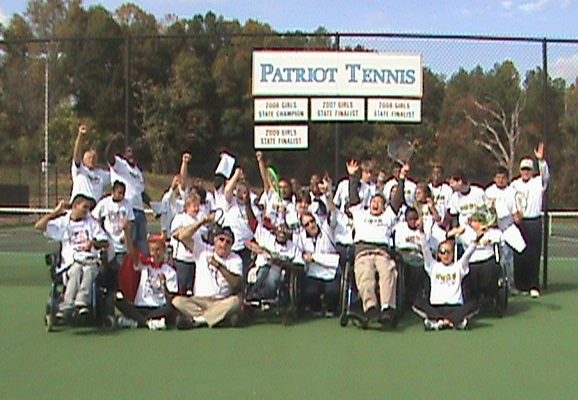
While we were talking with Powell, the rest of his volunteers were setting-up for a Young Life meeting and expected about 50 people to attend with about half of that number in wheelchairs. “We try to build friendships and relationships with our special-needs children and their families,” Powell explains. “Here’s what I mean. If you ask a special-needs child to draw a cartoon of what adults are like, that cartoon character probably will have a huge mouth and little bitty ears. I hope if that same student is asked to draw cartoon of a Young Life leader, that the cartoon character will have great big ears and a normal-sized mouth.”
Powell has a master’s degree in theology from Fuller Theological Seminary, in Pasadena, California, and he explains, “When I was going through the Young Life program, this school was the only one with an affiliation with Young Life. But today several schools are affiliated with Young Life.”
For years, Powell worked in the construction industry. Upon retiring, he went full time with David’s Table, following his passion for working with youngsters with disabilities. Now, instead of only working 8 hours a day, he’s free to work 8 - 14 hours a day, following his love for youngsters. And, Powell says, “I love it.”
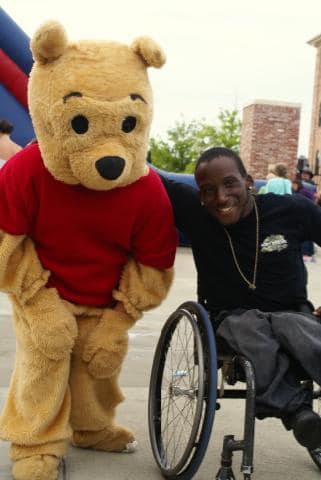
When we asked Powell about the future for David’s Table, he smiled and said, “That’s a good question. Right now, we’re working with the YMCA here in Greenville, trying to develop an aquatic program for our students with disabilities and their families. The concept that we’re working on is one where parents can bring their children, and they can all swim together; or where parents can leave their children, while mom and dad work out in the gym, or wherever. Then we’ll have a time where there are other programs available in the gym for the child and his family.
One day we hope to create an adaptive soccer program, an adaptive basketball program and an adaptive tennis program for our children and families. I’m hoping to get a large grant to hire someone to run these adaptive programs. We have plenty of volunteers who can and will help by working with these adaptive students and their families through the YMCA program.
The last Saturday in October, we’re going to Charlotte, North Carolina, to meet with ‘Joni and Friends,’ Joni Eareckson Tada’s radio program. Go to www.joniandfriends.org to learn more about this organization. We’re trying to develop a working relationship with them. This group works with many churches to help the churches get more involved with people with disabilities. We hope we can get some of their staff to come to Greenville and help develop the same type of church program that they have in Charlotte. The members of David’s Table want to be ‘Joni and Friends’ feet on the ground, to help them get established in our area.
“There are some horrible statistics about families who have disabled children in them. Eighty percent of the fathers leave the families with a disabled child and have no other connection with the family. Another statistic that’s scary is that when a baby is diagnosed with Down syndrome in the womb, that 80% of those children are aborted.
Only 14 % of the families who have a disabled person in them go to church. Fifteen percent of the population, in any state, will be disabled. If all the people with disabilities in the world were brought together to make up a country, that country would be the third-largest country in the world, as well as the poorest country. The need to minister to these families and these children is tremendous. One of our students, Big Mike, has lived in 15-different places in the last 5 years, including a car where he lived with his mom and various shelters.”
When we asked Powell what was his dream for David’s Table 20 years in the future, when he was 87, he quickly answered, “I haven’t thought that far ahead. However, I would like to see every church nationwide welcome, seek and bring-in families with a child or an adult with a disability and work with those families to meet their needs. Now, this could be a challenge, especially, if you had an autistic child sitting in the church, and a church official came down the aisle with incense. That child might say, ‘Wow, Mom, that stuff stinks.’
Although this scenario might not be good for worship, the church would have to develop a method to deal with this, so that these families could be included. One instance I’m aware of that actually happened was when an autistic child went to church, where the men were taking up the collection. He wanted to help take up collection too. So, the church put him in the rotation to take up the collection, thereby solving the problem. This boy would plan all month long for the day he would take up the collection.
If I could be granted a wish for able-bodied people, my wish would be that able-bodied people could be comfortable with the uncomfortable and with anyone who is disabled in any way. When we search for volunteers to help us, we are looking for volunteers who will be comfortable in uncomfortable situations.”
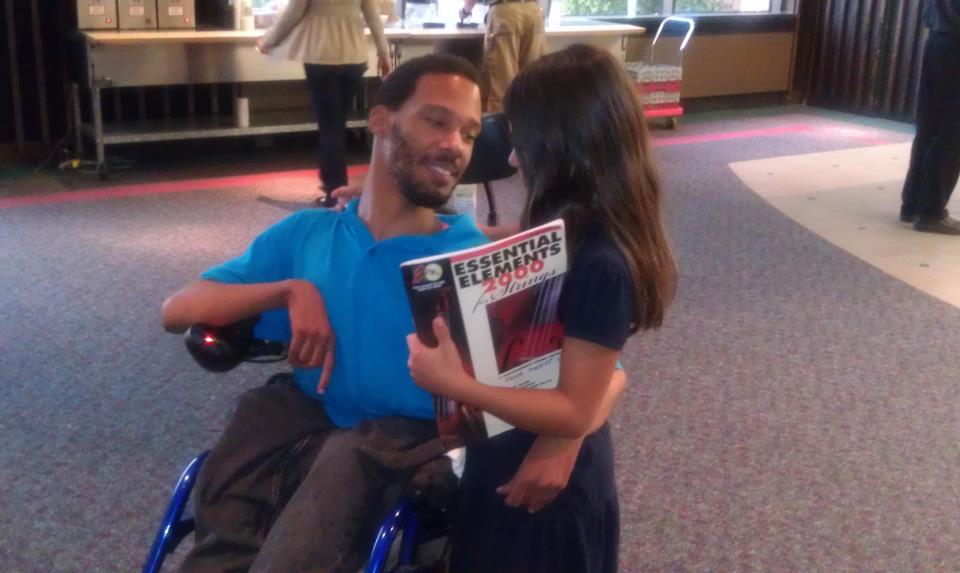
Robert “Skeeter” Powell works every day in changing the world for youngsters in his community and reaches out to other communities. Powell is one of those people for whom the word, “impossible,” doesn’t exist.
To learn more about Skeeter Powell and his David’s Table ministry, go to www.davidstableonline.org or the Facebook page, David’s Table, Inc.
For more information on people who change lives, go to www.amazon.com/kindle, and type in the names of John E. Phillips’ two new books, “Courage: Stories of Hometown Heroes,” and “Moving Forward: The Stories of Hometown Heroes.” You also can download a free Kindle app for your SmartPhone, iPad or computer to read the books.